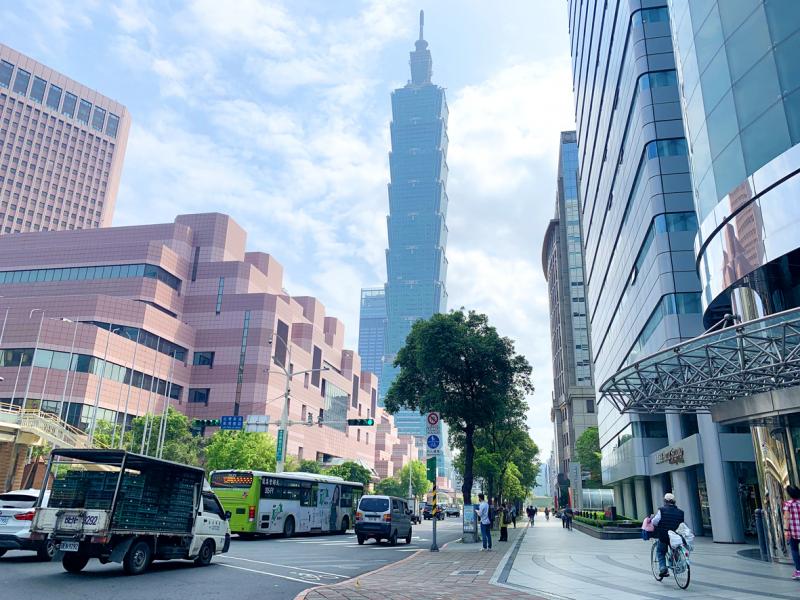Taipei is to designate three transportation hubs and six tourist hotspots as “Phase One Air Quality Management Zones,” with the types of vehicles allowed to enter them restricted, the Taipei Department of Environmental Protection said in a news release yesterday.
Vehicle owners and drivers failing to meet emission standards in those zones would be subject to fines from next year, the agency added.
Starting from Jan. 1 next year, large diesel vehicles would need to be certified and bear the government’s “Premium Self-management Logo,” showing that the vehicle’s emissions are in line with government standards, before they could enter the zones, it said.

Photo: Kuo An-chia, Taipei Times
Scooters failing to undergo the required regular inspections would also lose access to the zones, the agency added.
The air quality management zones would be Taipei City Hall Bus Station, Taipei Bus Station and Nangang Bus Station, as well as Yangmingshan National Park, the National Palace Museum, Chiang Kai-shek Memorial Hall, Sun Yat-sen Memorial Hall, the National Revolutionary Martyrs’ Shrine and Taipei 101, it said.
Offenders would receive verbal warnings throughout January, but from February they would face fines of NT$500 to NT$2,000, depending on their vehicle type, with a maximum fine of NT$60,000, it added.
Many cities in other countries, such as Berlin, Amsterdam, Stockholm and London, have implemented similar regulations to curb pollution, the agency said, citing London’s Ultra Low Emission Zone as an example.
The agency is introducing the regulations — the first in the nation — as diesel engine exhaust has been classified as being “carcinogenic to humans” by the WHO, Air Quality and Noise Control Division head Yang Mei-hua (楊梅華) said.
Regulations would first target large diesel vehicles, as the amount of fine particulate matter smaller than 2.5 micrometers (PM2.5) that they generate is much higher than other vehicles, Yang said, adding that it is also the reason for targeting major bus stations and sightseeing areas frequented by such vehicles.
Small diesel vehicles would not be included in the regulations, she said, citing lower emissions and the difficulty of enforcement, as inspectors cannot distinguish diesel vehicles from gasoline vehicles.
The new policy is expected to slash PM2.5 by 27.3 tonnes per year, down 4.5 percent from current levels, the agency said.

The Central Election Commission has amended election and recall regulations to require elected office candidates to provide proof that they have no Chinese citizenship, a Cabinet report said. The commission on Oct. 29 last year revised the Measures for the Permission of Family-based Residence, Long-term Residence and Settlement of People from the Mainland Area in the Taiwan Area (大陸地區人民在台灣地區依親居留長期居留或定居許可辦法), the Executive Yuan said in a report it submitted to the legislature for review. The revision requires Chinese citizens applying for permanent residency to submit notarial documents showing that they have lost their Chinese household record and have renounced — or have never

A magnitude 5.6 earthquake struck off the coast of Yilan County at 12:37pm today, with clear shaking felt across much of northern Taiwan. There were no immediate reports of damage. The epicenter of the quake was 16.9km east-southeast of Yilan County Hall offshore at a depth of 66.8km, Central Weather Administration (CWA) data showed. The maximum intensity registered at a 4 in Yilan County’s Nanao Township (南澳) on Taiwan’s seven-tier scale. Other parts of Yilan, as well as certain areas of Hualien County, Taipei, New Taipei City, Taoyuan, Hsinchu County, Taichung and Miaoli County, recorded intensities of 3. Residents of Yilan County and Taipei received

Taiwan has secured another breakthrough in fruit exports, with jujubes, dragon fruit and lychees approved for shipment to the EU, the Ministry of Agriculture said yesterday. The Animal and Plant Health Inspection Agency on Thursday received formal notification of the approval from the EU, the ministry said, adding that the decision was expected to expand Taiwanese fruit producers’ access to high-end European markets. Taiwan exported 126 tonnes of lychees last year, valued at US$1.48 million, with Japan accounting for 102 tonnes. Other export destinations included New Zealand, Hong Kong, the US and Australia, ministry data showed. Jujube exports totaled 103 tonnes, valued at

BIG SPENDERS: Foreign investors bought the most Taiwan equities since 2005, signaling confidence that an AI boom would continue to benefit chipmakers Taiwan Semiconductor Manufacturing Co’s (TSMC, 台積電) market capitalization swelled to US$2 trillion for the first time following a 4.25 percent rally in its American depositary receipts (ADR) overnight, putting the world’s biggest contract chipmaker sixth on the list of the world’s biggest companies by market capitalization, just behind Amazon.com Inc. The site CompaniesMarketcap.com ranked TSMC ahead of Saudi Aramco and Meta Platforms Inc. The Taiwanese company’s ADRs on Tuesday surged to US$385.75 on the New York Stock Exchange, as strong demand for artificial intelligence (AI) applications led to chip supply constraints and boost revenue growth to record-breaking levels. Each TSMC ADR represents